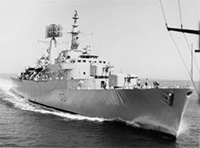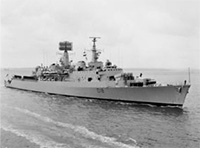Government of Chile Urged Not to Dump Warships
Groups Call for Former UK Naval Vessels to be Sent to a Green Ship-Recycling Facility
NGO Platform on Shipbreaking Press Release
 |
 |
 |
 |
| |
 |
|
| |
Former HMS Norfolk,
now named Capitan Prat |
|
 |
 |
 |
| |
 |
|
| |
Former HMS Antrim,
now named Almirante Cochrane |
|
 |
 |
 |
|
| |
2 July 2007 (Brussels, Belgium.) – The NGO Platform on Shipbreaking, a coalition of human rights and environmental groups working to prevent environmentally damaging and exploitive shiprecycling, has discovered that two decommissioned Chilean frigates (former UK navy vessels) named the Almirante Cochrane (formerly the HMS Antrim) and the Capitan Prat (formerly the HMS Norfolk) are soon to be sold on the international ship scrap market. According to the Platform the sale may happen as early as July 7th. The groups fear that unless Chile properly implements the United Nations' Basel Convention governing the export and disposal of toxic waste, the ships might go to the highest bidder and be processed in the "cheap and dirty" manner in the notorious shipbreaking beaches of India or Bangladesh where such toxic materials on the ships such as asbestos and PCBs are improperly managed and accidental deaths from explosions or from falling steel plates are all too common. A recent survey by the Indian government revealed that one in six workers showed signs of asbestosis, an occupational disease limiting lung capacity which can lead to one of the most painful forms of lung cancer.
"Chile has always been a very responsible government, respecting the Basel Convention completely. However we fear that the Chilean Navy may not know about the Basel Convention and might inadvertently become responsible for what would be illegal traffic in hazardous waste under international law," said Jim Puckett, coordinator of the Basel Action Network (BAN) and board member of the Platform coalition from London.
In 2004 the Basel Convention reminded all member countries including Chile that a ship could be considered a hazardous waste under that international waste treaty and that such exports should be minimized, should only be exported when full consent was agreed from all countries involved and only then if the destination was an environmentally sound facility. The shipbreaking beaches of Asia can not be characterized as environmentally sound according to Guidelines approved by the Convention.
Since then, the governments of Denmark and the UK have set a policy in line with the European Waste Shipment Regulation which incorporates the Basel Convention Ban Amendment disallowing export of government ships to non-OECD (developing) countries for shipbreaking. Last month the European Commission released a Green Paper, calling for a similar implementation of the Waste Shipment Regulation in all of the European Union 25 member states. Last year when France tried to claim that they did not have to abide by the Basel Convention when they sought to dump the aircraft carrier Clemenceau in India, a French court called the export off at the last minute and to the embarrassment of the Chirac government, France was forced to return the ship from India back to France.
"Chile would not want to repeat the mistake of France and provide a sequel to the Clemenceau horror show," said Platform Coordinator Ingvild Jenssen. "Rather they have an opportunity to set an example for nations all around the world."
BAN has alerted the Competent Authority of the Basel Convention as well as the Permanent Mission of Chile in Geneva in email communications late last week. In the letter BAN cited the Basel Convention rules and wrote: "We would fully expect therefore that Chile will not export the ships in question except to an environmentally sound facility somewhere in the world as required by the Basel Convention. And that the export will be accomplished only when notification and consent takes place in accordance with the Basel Convention. This will likely mean that the ship should NOT be sold to the highest bidder but to the highest bidder using an environmentally sound yard."
The Platform advises that if Chile lacks facilities for remediation of the toxic materials and for recycling the steel in a safe manner, the closest green shipbreaking yard would likely be found in the United States. But they also suggested that the UK might see that they bear some responsibility for the proper recycling due to the ship's British origin and due to the responsible export policy they have for their own warships.
"First we must ensure that Chile does the right thing and refuses to sell the ships to substandard Asian shipbreaking operators," said Jenssen. "Then we must see that the UK considers taking some shared responsibility for these toxic ships, according to the principle of Producer Responsibility."
For more information contact:
Jim Puckett, Basel Action Network in London from July 3 at: +44 20 867 23454, jpuckett@ban.org,
Skype: jimpuckett, website: www.ban.org
Ingvild Jenssen, NGO Platform on Shipbreaking, in Brussels, Belgium: +32 485 190 920, ingvild@shipbreakingplatform.org
FAIR USE NOTICE. This document contains copyrighted material whose use has not been specifically authorized by the copyright owner. The Basel Action Network is making this article available in our efforts to advance understanding of ecological sustainability and environmental justice issues. We believe that this constitutes a 'fair use' of the copyrighted material as provided for in section 107 of the US Copyright Law. If you wish to use this copyrighted material for purposes of your own that go beyond 'fair use', you must obtain permission from the copyright owner.
More News
|